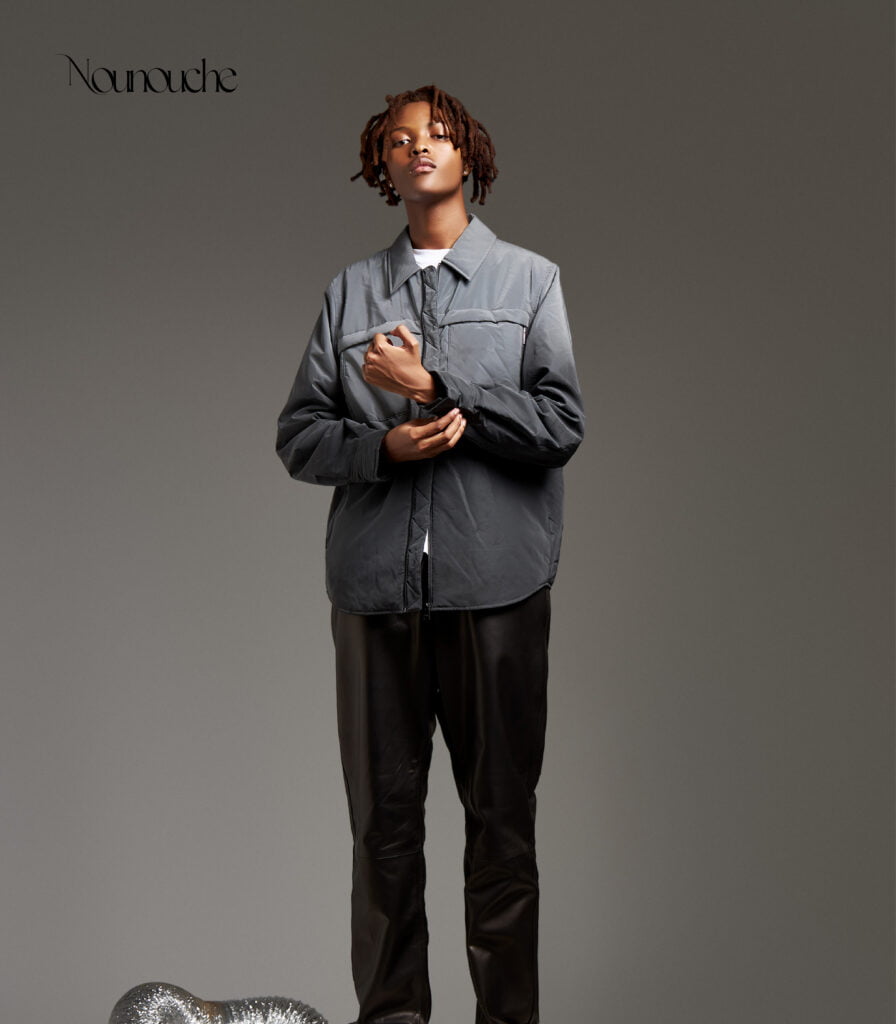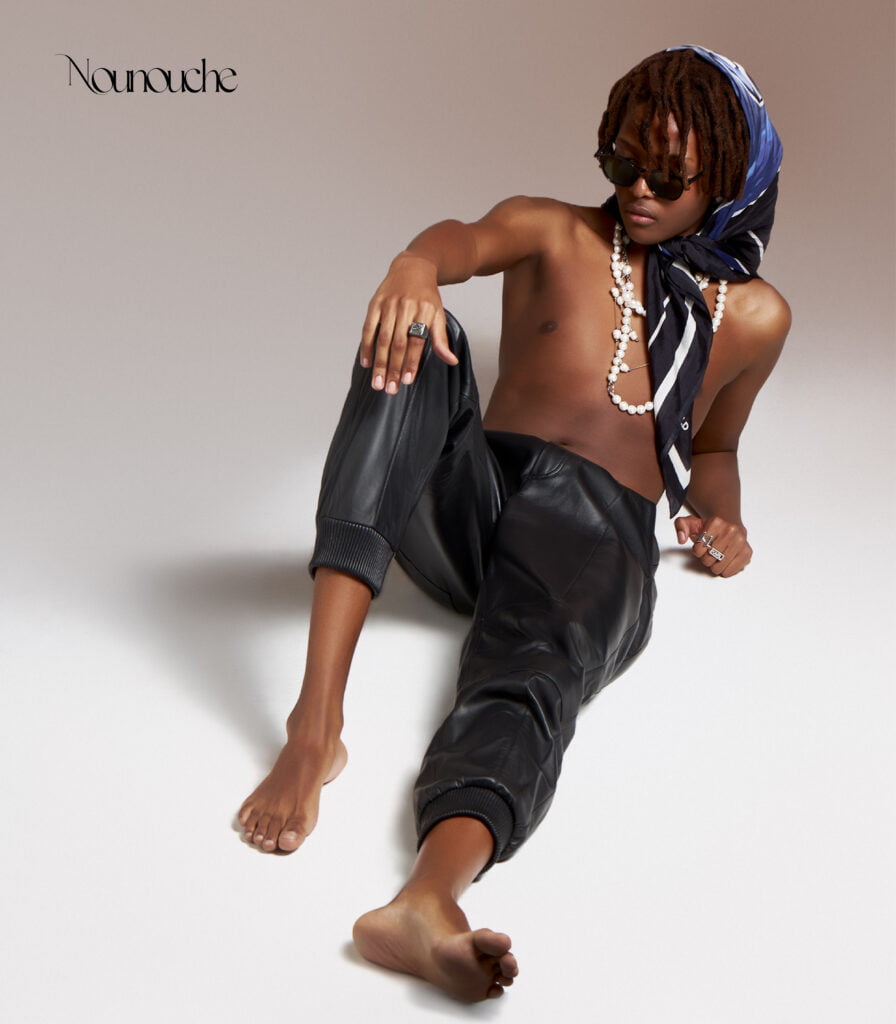Zoë Modiga: I am so honoured to be having this moment with you. I have been looking up to you as a cultural icon and as someone who has pioneered a lot of what we hear in our sounds, imagery and storytelling. To have this moment and see you in it is so beautiful to me. It’s not just giving you your flowers but also planting the Dana seeds and paying your story forward. I’m glad I can be part of that in a small way.
Simphiwe Dana: I love your work, I am glad you are in the music industry and your contribution to the cultural landscape is important. Sitting with you is special.
As the two musical powerhouses get comfortable with each other for the sit down interview, Zoë asks Simphiwe how she has been.
“I’m ok. It’s been a tough three years with the pandemic but I am ok and glad to still be here and to be doing the work we love and to still be appreciated.”
Zoë’s full name is Palesa Nomthandazo Phumelele Modiga and she often asks people about their names and the meaning behind them, a fascination she has to learn more about people.
“My other name is Sinethemba,” says Simphiwe.
And can you separate the two from each other, Zoë asks with a visible curiosity in her eyes.
“Sinethemba is different from Simphiwe, Sinethemba comes with an expectation and responsibility; it means we have hope. It means I’m supposed to come and fix things, be the relief in people’s lives which is a huge responsibility. As Africans, our names come with instruction on your life. Simphiwe is a gift, no expectations, just to come and shine.

There’s a clash in the names – time to take on responsibility and a time to shine.”
Zoë came to know of Simphiwe when her mother attended the Cape Town International Jazz Festival when the artist first performed there. Simphiwe mesmerized the audience so much she had to be moved to a bigger stage during her set to allow more people to see her.
Zoë received a call from her mother telling her about this artist and she had to find out more.
“I was so well received we had to move the venue. It felt surreal.”
Billy Domingo, festival curator, had to go on stage after much commotion from people who wanted to see Dana but could not gain access into the smaller venue. It was an historical moment for Simphiwe.
“When I came out there was no sound like mine and there was that peer pressure to suit the market. I am true to myself and couldn’t be what the industry wanted at the time.
I persevered in doing music my way and I didn’t expect the response I got from the South African audiences.”
The response she received from people caught her by surprise as she thought her music would have her end up as a lounge artist but instead she turned into a household name.
“The soundtrack of our lives,” adds Zoë who credits Simphiwe as the artist who gave her the context of being an African storyteller.

Simphiwe has her own influences in the music industry which taught her to be grounded in herself.
Her sisterhood with the late Lebo Mathosa is one such influence.
“Lebo was a loving somebody, a true sister. She took a special liking to me as a young artist and saw me as her younger sister, always gentle and straight forward. Even when we did the song (‘How Can I’ off the Dream album) she did not short change me. I learned a lot having her as my big sister, I knew and found my place. I understood every artist has their place and there is nothing wrong with that and being different.”
Simphiwe, a recluse as she calls herself, says she would like to do more for the generation of music artists coming up.
“I like to hide from society a lot. As I grow older, I feel like there is more I can do.”
Over the last two decades, Simphiwe has released five albums and played many roles as a musician- being a songwriter, singer and performer. Her most preferred persona is when she is on stage.
“Studio time is painful – it’s tough to bring words and melodies from a blank wall – creating something out of nothing. I go in when I need to purge or explode but it takes a lot of emotional drama for me to go to the studio. It’s painful and therapeutic in many ways, usually negative stuff you are trying to heal. Once on stage it is so worth it, it’s the closest I will get to God.”

One thing I can always count on my mother for is her support, no matter what I’m interested in she’s always on my team encouraging me to do my best in spite of everything. She is the type of mother that does everything she can to make us happy and make sure we’re safe wherever we are. I owe everything I am now to her.” Phalo Dana – Simphiwe’s son.
Simphiwe is often seen as a healer in the music space but this is not something she does intentionally.
“That’s what people say but all I know is that I try to heal myself. People take lessons from that as it resonates with them, by virtue of me healing myself it resonates with others.”
As she describes it, Simphiwe grew up quite poor but she was an overachiever who ended up finding herself in spaces that she would not have had access to because of her background.
“My mother sustained us with a huge garden and on weekends we’d go sell some of the fruits and vegetables with the wheelbarrow. We would sell sweets and ice cream at school. All of this made us be seen as pitiful and in many ways be treated as such. You will never see me ridicule someone, never hear of me doing that to others.”
“My mom taught me empathy, something I have taught my children. She would go over and above to be helpful. You grow up fast in the village. From age 4 you are already doing serious chores but there is still time to be a child. We would swim in the river and hunt birds and slide down the grassy hills. I had an idyllic life and did not feel poor.”
She only started to feel ‘poor’ when she moved to the village town of Tsolo but while she was growing up with her grandparents, on a big farmland full of animals that allowed them to feed themselves, Simphiwe did not feel anything other than being loved and cared for.

Zoë enquires, is that not wealth?
“It is. It was wealth and I feel like post 1994 we lost all of that and I don’t know why. When I go back home to the village now there is none of that. I had a lovely childhood balanced between responsibility and being a child – I learned individuality and freedom.”
She found it strange how people were so reserved in the big city when she eventually moved there.
Zoë asks whether it is that freedom that has led to Simphiwe’s sense of having no inhibitions in spaces like social media.
“There was a long time where I felt we needed to elevate the consciousness of the country. As creatives we are afforded so much time to observe the country and ourselves within that society and we express that on our various platforms and that comes with a lot of intuitiveness that you grow and cultivate from being that observer.”
Simphiwe has her finger on the pulse of the consciousness of the nation.
“From those observations you want to then impart that. I’ve made several predictions that have come true and when people one day look at my legacy, they will see for themselves.
I’ve passed on the baton now, I’m not interested anymore in doing that. I leave the space for those I have taught. I do think it’s important for artists with voices to use them in service of humanity but it shouldn’t define them, you don’t have to be a social activist. For those who feel compelled to be one then they should be.”

Simphiwe is known for shaking things on social media but she has never seen her expression as that.
“I amplify voices, I was surprised at reactions to the things I would say. I still don’t know why but I am grateful that I did try to use the voices.”
Simphiwe is part of a lineage of artists who form part of the musical heritage of the country.
“I exist in a bubble. I don’t think about those things, I’m just doing my own thing, being true and honest to myself. I’m quite a pedantic person when it comes to my work. I always go extra, every dot in the right place.”
This is visible in her work and in songs she dedicates to people who have left an indelible mark on her.
“If I’m going to write a song about (the late) Busi Mhlongo, I go very deep within my experience of her and make sure the emotion is in line with how I feel about the subject. When I wrote Mayine, I wrote it at a tumultuous time of her life. I was crying in the studio when I recorded because of how heavy her experience was on my shoulders.”
The legend Busi Mhlongo was a special person in Simphiwe’s life.
“I would call her during tours and instead of talking about her she would turn it around and make it about me while she was facing imminent death. She would praise, comfort and encourage me, so I wrote Mayine with all of that sitting on my shoulders and just the unfairness of it all. I was praying for blessings, praying for life, praying for rain onto this parched land that was her life. It really broke my heart and I wish she got her flowers properly while she was alive.”

“My mom is my best friend, she’s my number one fan and I am hers too. I don’t even know where to start when it comes to all of the things I love about her, it has to be her sense of humour. It is so weird! I catch her crying, laughing at the most random things, I love her quirkiness and how she lets my younger brother and I also embrace our “weird” sides. I’ll always appreciate her for letting us be us, and supporting us in any and all of our endeavours, even when she doesn’t always understand our interest – she knows it matters to us.” Zazi Dana – Simphiwe’s daughter.
Simphiwe’s latest production uMoya is a dedication to her mother.
It is a representation of spirituality or a spiritual experience. When someone is having a spiritual experience we say “unomoya”.
Simphiwe’s latest production Moya is a dedication to her mother.
“It was me trying to make sense of my mother’s passing, the emptiness that I felt and reaching out to God. I call the entity idlozi elikhulu for comfort.”
Simphiwe Dana presents MOYA directed by prolific Artistic Director and Choreographer Gregory Maqoma under the musical direction of the seasoned Titi Luzipho in March.





No Comments